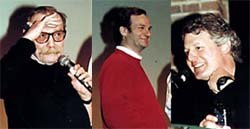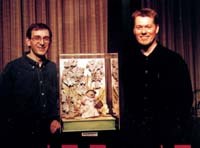A review of the 1998 Brussels Cartoon and Animated Film Festival, by Valie Hamon-Rivoallon. Available in French and English.

The 17th Brussels Cartoon and Animated Film Festival took place in Belgium, February 17 - 28, 1998. As usual, nothing was missing from the program. As it should be, parents came with their youngsters, a kid accompanied his uncle, someone wandered in lost, others were animation fans wild with enthusiasm, but everyone found something to satisfy their appetite. No less than a dozen animated features were screened, starting with Anastasia, which Don Bluth and Gary Goldman presented before its premiere at a public theater. Mark Dindal's Cats Don't Dance followed. Mr. Bug Goes To Town, the Fleischer Brothers' second feature, and Rene Laloux's Fantastic Planet were among some of the older films presented. But let's not forget the latest impertinences of Bill Plympton's I Married A Strange Person and Michael Schaack and Veit Vollmer's Little Asshole which is based on Walter Moers' comic books, and is very popular in Germany.

The Brussels 1998 poster.
Brilliant Lectures
In the field of special effects and computer graphics, short films vied with features in passionate lectures and demonstrations that offered inside information. Virginie Guilminot presented a retrospective of the Pixel Prize-INA winners which have been presented at Imagina since 1985. Computer animation was also honored by a presentation of international prize winning films from 1997 and 1998. Among the real coups of the festival was the unbeatable Industrial Light and Magic (ILM), represented by Hal Hickle, who compared his photo-realistic animation for Lost World with his more cartoonish effects in Men In Black. Jan Carlee spoke on behalf of Blue Sky|VIFX. Armed with very detailed slides and videos, he explained the specifics of the process based on the analysis of the behavior of light. He used two examples that were the exact opposite of each other, Joe's Apartment and Alien: Resurrection. Joe's Apartment seems to have been a true delight for the little crew who got carried away in a delirious escalation of effects. By contrast Alien presented more of a Chinese brain-teasing puzzle, but guided on this occasion by underwater images, Jan Carlee didn't hesitate to take the plunge and deliver some tests and experiments. Arnault Lamorlette, Rob Legato, Michael Roosens, Jean-Marc Geyer, Kim Goosens and Rudy Verbeeck were also present to discuss their special effects work for City Of Lost Children, Titanic, and Donkey Kong Country.

Former ASIFA International President, Raoul Servais and current ASIFA International President, Micheal Ocelot at Brussels '98. Photo courtesy of Folioscope.
A Bevy of Screenings
Besides short films, three other types of screenings were offered: retrospectives, compilations of films or television specials on a specific theme, and the best in the latest creations from among 80 films from some 15 countries.
The retrospective homages were devoted to the Finnish filmmaker Marjut Rimminen, who was named 1998's artist-of-the-year in her native land. She commented on her career, tracing through her beginnings in commercials (notably for Tetra Pak), to children's films (The Frog King, Urpo And Turpo), and then to her more personal works. She won a prize at Zagreb for her first advertising film, and has never stopped experimenting, not only for the BBC, but also for John Halas and Joy Batchelor. Meanwhile with more polemic films, she gained recognition with Christine Roche, most notably for I'm Not A Feminist, But..., and then with the very sharply toned Blind Justice - Some Protection, which is about the condition of women in prison. Her mastery of narrative structure reached its height in The Stain, a family psychodrama from 1991 based on a news item. Mixing drawn animation with animated puppets, it uses flash-backs and looped repetitions to reconstruct an enigma on a growing emotional rhythm. In 1996, Many Happy Returns exploited the same method for a sorrowful and moving introspection. This time she even utilized some computer graphics. The film has won Grand Prizes at the festivals in Odense and Espinho.

Snapshots of presenters at Brussels '98 from left to right: Jaques Rouxel, Robert Legato and Jan Carleé. Photos courtesy of Folioscope.
Today, working in England, Marjut Rimminen devotes a good part of her time to teaching. Katarina Lillqvist, her partner, is originally from Tampere. After studying filmmaking, she began editing documentaries for television before leaving for Prague in 1989. Working at the Trnka Studios, she acquired all the skills of puppet animation. She began directing her own puppet films in 1991. After a tentative beginning with Marie, she continued to develop more with each new film, for which she drew her inspiration from the works of Franz Kafka. The Country Doctor, her latest film, is rich in symbolism, and won the Silver Bear at Berlin in 1996.
As for the thematic programs: Lobster Films concocted a Franco-American voyage to update to today's taste the little gems from the era of 1910 to 1943 (Winsor McCay, the Fleischer brothers, O Galop, Andre Rigal...), the Utrecht Festival offered an array of the latest Dutch films, and the program "Animation from the South" brought together films from Benin, Burkino Faso, Brazil, India and South Africa, many of which came from Rights of the Heart, the latest series of Canadian films on Human Rights initiated by Therese Descary. The Television Specials led us to discover a tender, poetic Christmas tale The Jingle-Bell Boy by Jacques-Remy Girerd, Eugenio by Jean-Jacques Prunes, a colorful adaptation of a book illustrated by Lorenzo Mattoti, and Famous Fred by Joanna Quinn in which the hero's pranks don't leave you sad.

Among the mixed crowd at Brussels '98 were Georges le Gloupier, who made headlines for throwing a pie in Bill Gates' face just a week prior to the festival, and Belgian humorist Bruno Coppens on the right. Photo courtesy of Folioscope
The Icing on the Cake
Not every film can be mentioned, but in closing the International Selection must be mentioned. The list of films vying for the Cartoon d'Or award were screened in four evening programs. We discovered the latest offspring of the bolexbrothers from the Royal College of Art, some advertising spots by Aardman Studios, and the revelations from the last Annecy Festival: Alexander Petrov's The Mermaid, Daniel Greaves' Flatworld, and other novelties by Bill Plympton, Phil Mulloy and Beriou...
Nice surprises came from: Walt Disney Television Animation with Redux Riding Hood, which is the tale of Little Red Riding Hood revisited in a delirious fashion by Steve Moore; the Prague Academy of Performing Arts and the London Royal College of Art which yielded Stopaz by Maria Prochazkna, a leisurely promenade in a public park, and We Love You by Neil Allcock, a puppet animation about a little world of groupies; and the Illuminated Film Company (British/Dutch) with T.R.A.N.S.I.T. by Piet Kroon, a film puzzle in which the only thread, a suitcase, takes us to all four corners of the globe, giving some artists like Michael Dudok de Wit and Valerie Carmona the opportunity to show us new facets of their talents.

Master puppet craftsman, Mackinnon & Saunders, brought a puppet from Brambly Hedge to the festival. Photo courtesy of Folioscope.
All in all, following their usual formula, it was a very animated twelve days.
Translated from French by William Moritz.
To purchase Best of the Brussels Animation Festivalvideos, visit the AWN Store.
Originally a screenwriter, Valerie Hamon-Rivoallon has worked in journalism since 1988. On the editorial staff of BREF, a magazine devoted to the short film, she has specialized in animation since 1993, preparing special reports on such topics as the state of animation in Slovakia and Belgium. As a member of AFCA (The French Association of Animation), she has organized the monthly programs of the Animatheque since September 1997, and has been involved with reorganizing the National Festival of Animation on Theater Screens. The next festival will be March, 1999.







